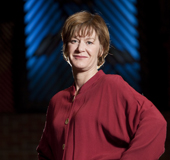Taking an “interdisciplinary” approach in academe is seemingly one of those things that everyone claims to value, but no one actually does. The UK Committee on Social Theory was established to change that. It was built around grounding its participants in the perspectives, theories and assumptions of other disciplines to better understand and advance their own disciplines. And the heart of the program is Social Theory 600.
“Honestly, UK seems to be putting its money where its mouth is as regards interdisciplinarity to a degree that I have not seen at other universities,” declared Marion Rust, associate professor in the Department of English, who will be co-teaching ST 600 for the second time in spring 2011. “It is a word that institutions use very frequently but commit to less often.”
The theme of this spring’s class is “Self/Story: Perspectives on Life Narrative.” Taught by four professors, each from a different department within and outside UK’s College of Arts & Sciences, the seminar will examine autobiographical literary devices from the perspective of disciplines such as history, psychology and Chinese literature. Having co-taught ST 600 before, Rust is excited to do it again.
“It was one of the most rewarding classes I’ve ever taught,” said Rust. “It was my first opportunity really to see interdisciplinarity in action in the classroom. I was also able to have a mini-education in disciplines I knew almost nothing about and be a student of the class in that sense.”
 In this seminar, young scholars surround and approach a single topic from their own unique perspectives, metaphorically bumping up against each other and debating the values and assumptions of the other’s take on the topic. “It’s about bringing people together and watching the sparks fly,” explained Rust. “In the process, we defamiliarize our own thought processes and see where our work makes assumptions that might remain invisible to us otherwise.”
In this seminar, young scholars surround and approach a single topic from their own unique perspectives, metaphorically bumping up against each other and debating the values and assumptions of the other’s take on the topic. “It’s about bringing people together and watching the sparks fly,” explained Rust. “In the process, we defamiliarize our own thought processes and see where our work makes assumptions that might remain invisible to us otherwise.”
In building the foundation of a research portfolio that they hope will ultimately launch their academic career, graduate students often face the contradictory requirements of thinking outside the box with their dissertation while staying inside the box of their discipline.
“You have been so saturated with trends in disciplinary thought that you’re following the rules in big way when it comes to your dissertation,” said Rust of the frustrations that face many dissertation writers. “It doesn’t sound new. It doesn’t sound fresh. And the funny thing about a dissertation is it has to sound new and fresh even though it comes from that immersion in a field. I think social theory is the best way to start thinking about how to do something original. It just wakes you up being in that classroom.”
Even further, Rust argues, a commitment to old and arbitrary distinctions between the disciplines is anti-intellectual. “The production of knowledge occurs in a way that I think more closely approximates truth when you have an interdisciplinary perspective,” she said. “Scholarship will stagnate otherwise.”
When it comes to autobiographical narrative, Rust has high expectations that the participants in this spring’s ST 600 will deliver a comprehensive appreciation of its potential.
“I just can’t imagine that we’re not going to have a better understanding of life narrative when we look at it through psychological and historical lenses, when we think about ancient Chinese narrative in relation to 21st century academic autobiography,” said Rust. “Is that not going to help us ask better questions regarding why people write about themselves and what ultimately matters about that act?”
If you are a graduate student at the University of Kentucky, stop by Patterson Office Tower each Friday afternoon this spring to watch the sparks fly in 600 different directions.
By Rebekah Tilley photos by Richie Wireman
